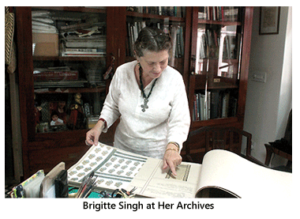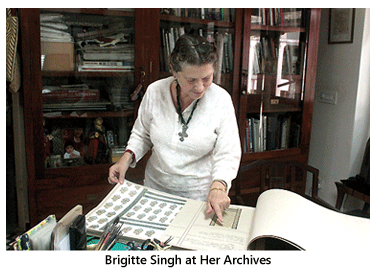 NEW DELHI: The interesting journey of Brigitte Singh from being a Parisian art student to an internationally acclaimed textile virtuoso in India is chronicled in a new book.
NEW DELHI: The interesting journey of Brigitte Singh from being a Parisian art student to an internationally acclaimed textile virtuoso in India is chronicled in a new book.
“Brigitte Singh: Princess of the Mughal Garden” talks about how Singh approached her craft, peeling off dusty layers from the long-obscured story of block printing in the subcontinent.
The book, edited by graphic designer-photographer Bishwadeep Moitra and published by Mapin, is a sort of visual biography of Singh and her work.
It has essays by museologists, textile designers and scholars such as Jasleen Dhamija, Laila Tyabji, Rosemary Crill, Aleta Bartel, Michel Beihn, Jacqueline Jacques, Chandramani Singh and Sheela Reddy, who talk of different aspects of Singh’s work and life.
According to Ambassador of France to India, Alexandre Ziegler, Singh’s art is an act of true humanism and in that it emanates from a sincere study of history and traditional techniques, with the noble intent to preserve the living heritage of textile art.
“The passion that Brigitte Singh nurtures for this art dates back to her first journey to India in the late eighties, when she came to study Indian miniatures and was enamored by the resemblance of the 17th-century cloth from Provence to the Mughal cloth, made popular by traders who travelled the spice route,” he writes in the book’s foreword.
In her piece “Brigitte Singh: Master Craftswoman”, Tyabji says that Singh’s journey from a Parisian art student to an internationally acclaimed textile virtuoso did not come easily.
Her marriage into an aristocratic Rajput family and an entirely different culture, her struggles to establish quality and work ethos in a declining craft tradition among other things could have discouraged a lesser person, she says.
“But sustained by her inner voice, a love for India and her craft, and a refusal to settle for anything less than the best, Brigitte Singh has emerged triumphant and unique,” Tyabji writes.
Singh first came to Sanganer, Jaipur’s hand-block-printing centre, as a student of miniatures three decades ago.
Today, the visual almanac of her work gives one an alternative way to read medieval and modern civilizational encounters – through the evolution and transmission of motifs and craft techniques over centuries.
Her exquisite work with block prints is a form of re-enacted design history, rendered in visual rather than textual terms. Uncovering and reaching down to the purer forms, to the composite aesthetic of the 18th century, it offers a singular source of access to a seminal design.-PTI







